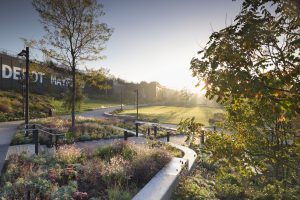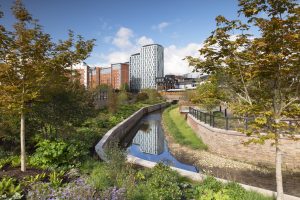2023 Awards Winner’s Spotlight: Best Practice Innovation
Mayfield Park
The Mayfield Partnership
This award was sponsored by:
Mayfield Park is a ground-breaking piece of environmental design and engineering, that has led to the creation of the first city centre park in Manchester in over 100 years.
Designed by Studio Egret West, the park was made possible by a public-private partnership between Manchester City Council, Transport for Greater Manchester, LCR and developer U+I, and is a visionary move to establish a high-quality landscape scheme that can respond to the climate crisis as well as creating a nature-rich haven for visitors. The park is the first phase of the new green quarter which will eventually include 13 acres of green space.

Mayfield Park, Manchester, UK.
Recognising that delivering green open space is one of our best tools in fighting the climate and biodiversity emergencies in urban areas, the Mayfield Partnership has delivered a park, naturalised a river channel, including “daylighting” of a heavily culverted section, and delivered a mosaic of natural habitats along its length. The park will act as a flood zone for the River Medlock during extreme weather events, to help minimise flood risk elsewhere in Manchester.
In addition, the Park provides a connection to groundwater for surface water discharge, with four rain gardens infiltrating flow to the ground. Remaining flow will be discharged to the river via several discharge points, including two that discharge water to a wildscape area prior to the river, further slowing flows whilst providing natural irrigation.
Discharge from the entire Mayfield development, including future buildings, will be routed via the park and peak flows will be reduced by approximately 1,000 litres per second. Importantly, no surface water from the Mayfield development will discharge to sewers, reducing strain and flood risk on the ageing piped infrastructure below. All impermeable footpaths fall towards soft landscape areas, reducing the need for traditional drainage channels.
Planting 63,000 plants, 60,000 bulbs and 140 trees (40 different species) will improve air quality, reducing nitrogen dioxide and particulate matter. They will also provide local benefits of reducing air temperatures, meaning that, coupled with the river, they will provide a respite for city residents during our warmer summers. The Park will also offer climate resilient habitats for flora and fauna to thrive, creating space that includes a 1.5 acre wildscape area, to support an urban ecosystem. Geomorphological modelling of the river has identified opportunities for fluvial and riparian habitats that have been incorporated into the design, as well as 26 different habitat features on land.

Mayfield Park, Manchester, UK.
The flora of the Park is specified to be resilient to the local climate. If irrigation is required, three existing wells have been reactivated and will provide water for the Park, eliminating irrigation demand on citywide water networks. This intervention will save an estimated 3 million litres of water and one tonne of carbon a year.
Whilst monitoring programmes are due to commence from spring 2023, kingfishers, sand martins and bats have already been sighted and brown trout are now swimming in this stretch of the river. The park also includes a destination play area to attract families back into the city and inclusive and accessible design throughout. Latent provision has also been made for park events at a range of scales including power supplies, cabling and the provision of wide footpaths. Mayfield Park leads the way, in terms of using landscape to combat the challenges presented by climate change.
The park is an instant benchmark of what successful city planning and innovative environmental design can look like. It’s about what can be achieved, with strong bold, city leadership, visionary design and effective partnerships to deliver a meaningful, practical and transformative response to the climate emergency.
Many of the component parts of the curated space are directly replicable to many city parks or other greenspaces from wildflower rich borders, sensitive and appropriate tree planting to the inclusion of swales, ditches, soakaways and rain gardens and the ambition to recycling existing materials on site.
It will make the integration of nature-based solutions into challenging urban landscapes the norm, not the exception, when it comes to planning the cities of the future.
The project was delivered collaboratively, with effective engagement and involvement of planners, ecologists, environmental managers and specialists from a range of organisations from the outset. They supported the forming of the basis of design at the Strategic Regenerative Framework stage and continued through detail and implementation stages to support a successful collaborative approach to delivering a tangibly environmentally and ecologically beneficial scheme.
We will be posting further information on each of the 2023 Awards Winners over on our blog.
